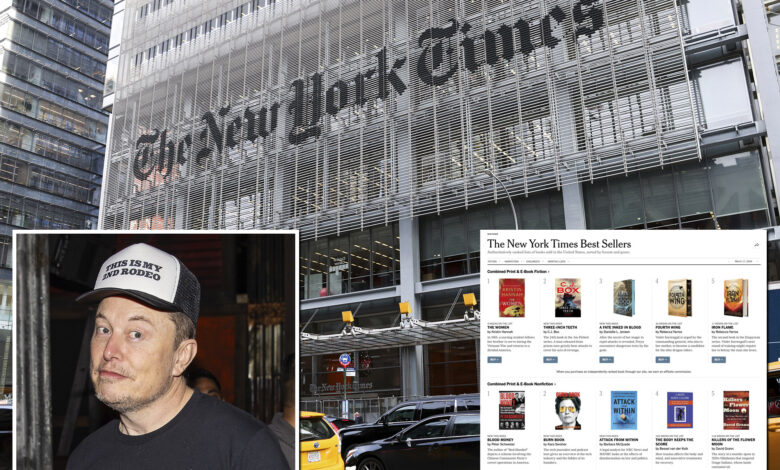New York Times under fire again — this time over bestseller list after Elon Musk tweet: ‘Pure propaganda’

The New York Times is facing fresh controversy over its influential bestseller book list after Elon Musk posted on X about a years-old lawsuit that accused the paper of tweaking its rankings according to subjective criteria.
“The New York Times is pure propaganda,” Musk, the CEO of X, wrote on Sunday in response to a post that said the list is “editorial content,” not based on sales figures.
“Like everything else in Sulzberger’s paper, the NYT bestseller list is fake,” wrote Balaji Srinivasan, the former chief technology officer of Coinbase and former general partner of venture capital firm Andreesen Horowitz.
Srinivasan, who is also the author of “The Network State,” continued: “They were forced to admit in court that it is not a ranked list. It’s actually ‘editorial content’ and they can exclude books they don’t like.”
In his post, Srinivasan provided a link to a “Kill Zone,” a blog devoted to top thriller and mystery writers, which recounted the story of William Peter Blatty, who wrote “The Exorcist” and its sequel, “Legion.”
In 1983, Blatty sued The Times for $6 million in Los Angles Superior Court, claiming the Grey Lady “ignored actual sales figures” from his publisher for “Legion,” alleging that it was kept off the list because of “either negligence or intentional falsehood.”
The blog said that The Times, which claimed the list was derived from sales, countered in court that its list “was not mathematically objective but was editorial content and thus protected under the Constitution as free speech.”
A rep for The Times declined to comment on Tuesday but shared the same link it shared with Esquire to its methodology, which says the weekly lists are “determined by sales numbers” from a variety of sellers across the country. It does not specify how The Times uses that information to determine where a book lands on the list.
The California court dismissed Blatty’s case but it was reinstated by the Court of Appeal in LA, saying the author was entitled to go to trial to try to prove the paper falsely represented the list as accurate and unbiased.
The Times brought the case to the state Supreme Court, saying the appellate ruling could open a Pandora’s Box to widespread legal claims by other authors that being off the list had cost them some kind of “prospective advantage.”
The Supreme Court declined to hear the case, leaving the lower court’s ruling that The Times bestseller list was “editorial content, not objective factual content,” which gave the paper license to exclude whatever book they deemed fit.
The ruling still surprises critics who assumed the list was a direct reflection of books with the highest sales.
Content strategist Jason Levin, who wrote “Memes Make Millions,” replied to Musk’s post: “NYT Bestseller list = Our favorites because we have better taste than the average American because we’re smarter Forbes 30 Under 30 = Forbes 30 Dumbasses We Tricked into Paying Us TIME Person of the Year = hahah remember when Hitler was person of the year yeah me too.”
Free Press founder and editor Bari Weiss added: “‘BAD THERAPY’ by @AbigailShrier is the #1 book on all of Amazon. But didn’t make the @nytimes bestseller list.”
While the bestseller list debuted in October 1931, the confusion about its methodology endures today.
The opaque path to making The Times’ bestseller list has been widely written about over the years, and includes several lists covering paperbacks, audiobooks, e-books, children’s books and business titles among others, as well as serious marketing and PR campaigns from book publishers.
In Equire’s 2022 piece “The Murky Path to Becoming a New York Times Best Seller,” scribe Sophie Vershbow, chronicled the confusing methodology.
“No one outside The New York Times knows exactly how its best sellers are calculated—and the list of theories is longer than the actual list of best sellers,” Vershbow wrote.




